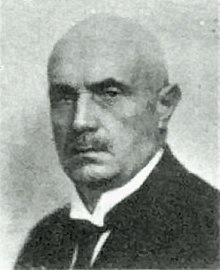Emil Nitzschke
Emil Robert Otto Nitzschke (born October 31, 1870 in Hadersleben , † July 24, 1921 in Leutzsch near Leipzig ) was a German politician (NLP, DDP).
Live and act
After attending school, Nitzschke took up the trade. According to his own statements, he trained himself “scientifically” through independent studies.
Nitzschke was politically active in the German Empire in the National Liberal Party (NLP). In 1909 he was elected to the second chamber of the Kingdom of Saxony for the first time , to which he belonged from then on without interruption until the collapse of the monarchy in Germany in November 1918 and in which he led the parliamentary group for the NLP.
A few weeks before the end of World War I and the collapse of the monarchy in Saxony, the Saxon King appointed Nitzschke as a minister without a portfolio in the Saxon state government.
Around the turn of 1918/19 Nitzschke joined the newly founded German Democratic Party (DDP). In the first Saxon parliament of the Weimar Republic ( Volkskammer ), Nitzschke was chairman of the DDP parliamentary group. He belonged to the first republican state government in Saxony from October 1919 to April 1920 as finance minister. He also acted as Saxony's representative at the Reichsrat .
From 1919 to 1920 Nitzschke was also a member of the Weimar National Assembly as a representative of constituency 28 (Saxony). He was also a member of the Leipzig district committee and the first honorary community elder in his place of residence. There were also some literary works, especially on economic issues.
Fonts
- Community politics and social democracy , Dresden s. a. [1914].
Individual evidence
- ↑ Ben Bütner: The November Revolution in Dresden 1918/19 . Grin Verlag, Munich 2008, ISBN 978-3-640-15995-6 , p. 27.
Web links
- Emil Nitzschke in the database of members of the Reichstag
- Emil Nitzschke in the online version of the Reich Chancellery Edition Files. Weimar Republic
- Barbara Hillen: Nitzschke, Emil Robert Otto . In: Institute for Saxon History and Folklore (Ed.): Saxon Biography .
| personal data | |
|---|---|
| SURNAME | Nitzschke, Emil |
| ALTERNATIVE NAMES | Nitzschke, Emil Robert Otto |
| BRIEF DESCRIPTION | German politician (NLP, DDP) |
| DATE OF BIRTH | October 31, 1870 |
| PLACE OF BIRTH | Hadersleben |
| DATE OF DEATH | July 24, 1921 |
| Place of death | Leutzsch near Leipzig |
